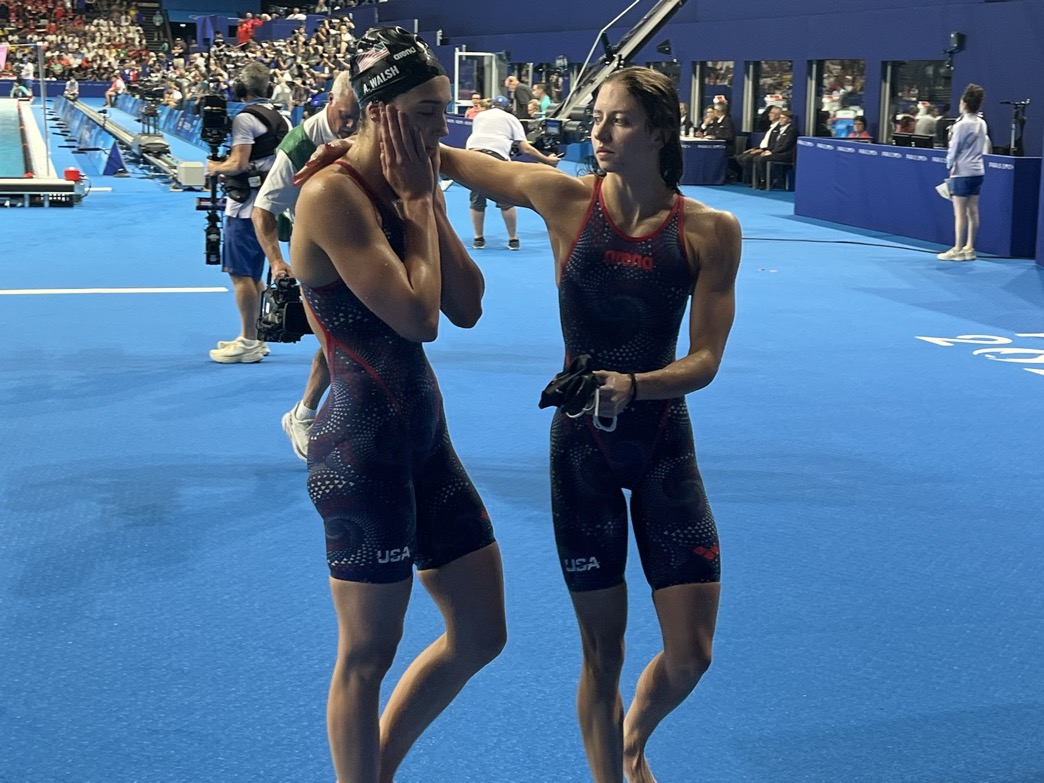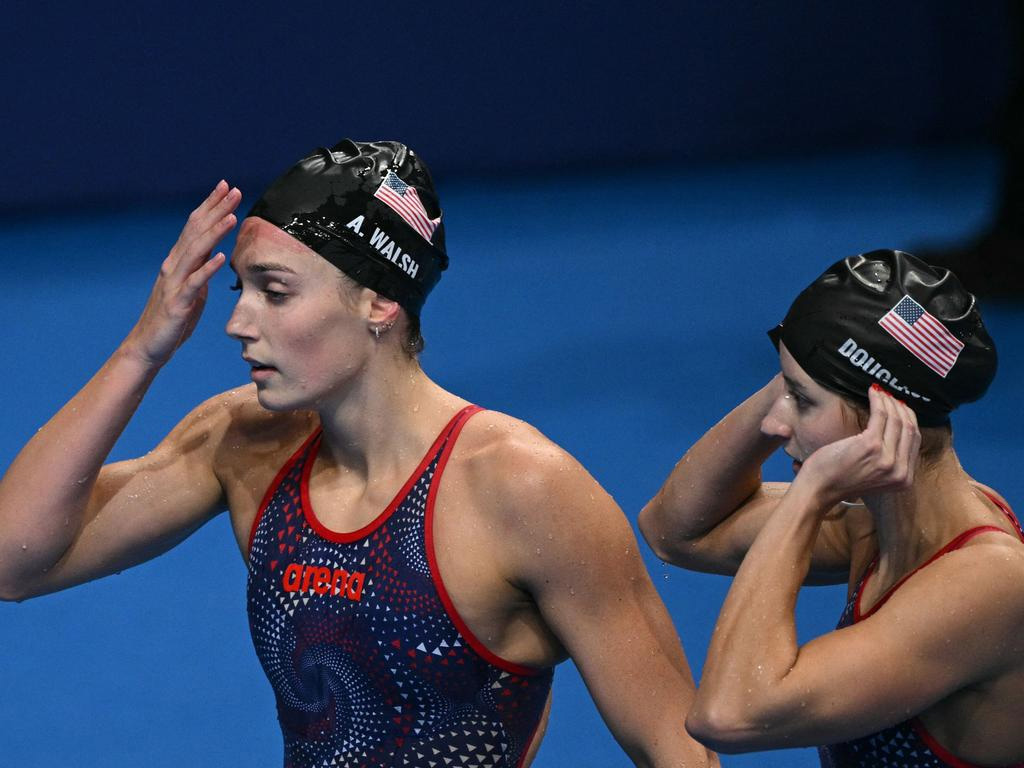Alex Walsh's Olympic Heartbreak: Disqualification At Paris 2024
What does it take to achieve Olympic glory, and how quickly can it be snatched away? For Alex Walsh, the dream of a bronze medal at the 2024 Paris Olympics turned into a heartbreaking disqualification, a stark reminder of the razor-thin margins that define elite sport.
The narrative of the women's 200m individual medley at the Paris Olympics is, at its heart, a story of triumph, near-miss, and the harsh realities of competitive swimming. The American swimmer, a silver medalist from the 2021 Olympics, initially touched the wall in third place, seemingly securing a bronze medal. She trailed behind Canada's Summer McIntosh, who demonstrated an exceptional performance, and her American compatriot Kate Douglass, who clinched the silver. But the elation was short-lived.
| Full Name | Alexandra Walsh |
| Date of Birth | August 7, 2001 |
| Place of Birth | Nashville, Tennessee, USA |
| Nationality | American |
| Height | 5 ft 7 in (1.70 m) |
| Sport | Swimming |
| Events | Individual Medley, Freestyle, Backstroke, Butterfly |
| University | University of Virginia |
| Coaches | Todd DeSorbo |
| Major Achievements | 2021 Olympic Silver Medal, Multiple NCAA Titles |
| Website | University of Virginia Athletics |
The initial results saw Walsh in third place, a position that typically guarantees a spot on the podium. The competition had been fierce, with McIntosh showcasing her dominance and Douglass delivering a strong performance. The race unfolded with each swimmer pushing their limits. Walsh, a seasoned competitor known for her versatility in the individual medley, navigated the butterfly, backstroke, breaststroke, and freestyle legs with skill and determination. However, as the race concluded and the swimmers approached the final touch, a crucial detail emerged.
The World Aquatics rulebook, the governing body of international swimming, has specific regulations regarding the execution of each stroke, including the transitions between them. The backstroke leg requires swimmers to maintain a position on their back throughout the race, touching the wall on their back. According to the governing body, Walsh's transition from backstroke to breaststroke was deemed illegal.
Replays of the race confirmed the infraction. Walsh was not fully on her back when she touched the wall at the end of the backstroke leg. Instead, she had rotated onto her stomach, violating the rule that dictates the specific form required for a legal turn. This seemingly minor deviation from the prescribed technique resulted in her disqualification.
The consequences were immediate and devastating. Walsh's bronze medal was revoked, and the spot on the podium was awarded to Australia's Kaylee McKeown, who had finished in fourth place. The moment served as a brutal reminder of the exacting standards of Olympic competition, where success and failure can be separated by fractions of a second and the strictest adherence to the rules.
The disappointment was palpable, not only for Walsh but also for her supporters. Fans, teammates, and coaches watched as the initial elation of a hard-earned podium finish turned to the bitter reality of disqualification. The story also highlights the psychological toll of such a close call, where the athlete's effort and dedication can be nullified by a technicality.
In the aftermath, the focus shifted to the details of the race and the implications of the disqualification. The swim itself was a testament to the competitive spirit of the athletes involved. Summer McIntosh, in a display of superior skill, took the gold, while Kate Douglass claimed silver, securing a strong performance for the American team. For Walsh, the moment was a stark reminder of the fine lines in Olympic competition.
The women's 200m individual medley at the Paris Olympics became a study in contrasts, offering a complex narrative that encapsulates the peaks and valleys of competitive sport. For Summer McIntosh, it was a moment of triumph, a culmination of hard work. For Kate Douglass, it was a celebration of consistent performance. For Alex Walsh, it was a moment of heartbreaking disappointment.
The ramifications extended beyond the immediate outcome. For Walsh, the disqualification served as a lesson in the nuances of her sport. It highlighted the importance of technical precision and the critical role of rules enforcement. The experience would surely become a catalyst for introspection, a chance to learn from the experience and continue to improve. This experience may ultimately become a critical point in her swimming career.
The drama of the race didn't overshadow the other performances. Summer McIntosh of Canada dominated the event, showcasing her mastery of the medley and winning the gold medal. Kate Douglass of the United States swam a strong race, securing the silver medal and demonstrating the consistent strength of the American swim team. Both swimmers offered a reminder of the skill and dedication required to reach the top of the sport.
The disqualification of Alex Walsh is a poignant reminder of the complexities of the modern Olympics. It's a story of human effort, strict rules, and the often-unpredictable nature of competition. The 2024 Paris Olympics, and especially the women's 200m individual medley, is a perfect showcase for the drama inherent in sport.
This outcome is not unique in Olympic history. Disqualifications for technical infractions occur across various sports, highlighting the importance of maintaining the integrity of the competition and adhering to established rules. The decision, though difficult, reflects the commitment to fairness and ensures that all athletes compete on a level playing field.
Alex Walsh's journey is not over. The experience, though painful, will likely serve as fuel for future competitions. The talent and dedication that brought her to the cusp of an Olympic medal remain, and the focus now shifts to using this experience as a learning opportunity.
The response to the disqualification also provides an opportunity for insight. The reactions of the fans, the media, and the athlete herself offer insights into the pressures, the dedication, and the broader impact of competitive sports on individuals and the world.
The impact of the disqualification will likely reverberate throughout the swimming world. Coaches and athletes will pay even closer attention to the technical details of the stroke, and governing bodies might review their regulations or the way in which they are enforced.
Ultimately, the story of Alex Walsh at the Paris Olympics is a story of the highs and lows of elite sport. It is a testament to the dedication of athletes and the exacting standards of Olympic competition. While the dream of a bronze medal was taken away, the journey and the lessons learned will surely endure. As Alex Walsh continues her career, this experience will serve as a reminder that even in the face of disappointment, the spirit of competition, the love for the sport, and the quest for excellence remain.


